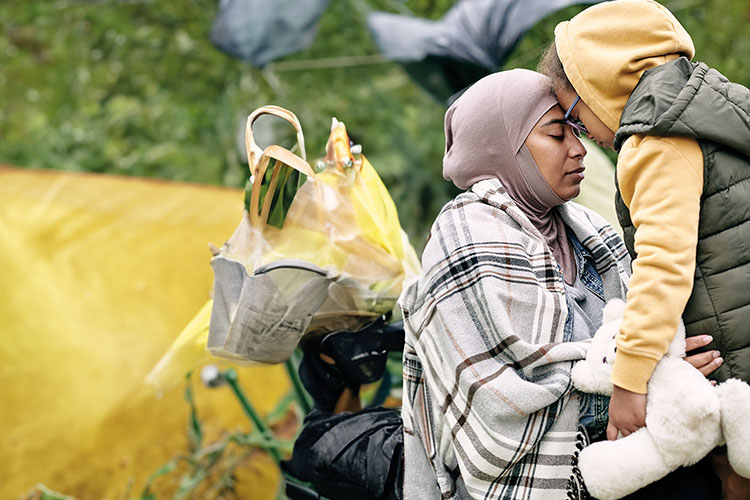
Tim Marshall recounts Saudi Arabia’s shocking ‘solution’ to a refugee influx and argues there is only one real answer to this global problem

Geopolitical Hotspot
There’s a familiar beginning to a migrant/refugee story, but one that ends in a shockingly unfamiliar way. Hundreds of desperate Africans, fleeing poverty and war, had managed to leave their country of origin in search of a better life. They crossed borders and paid people smugglers who put them in overcrowded boats to make a dangerous sea journey. The long trek was almost over. At last, the ‘promised land’ was in sight, the place where there is no war – one where they could perhaps get jobs and begin new lives.
Then the mortars and rifles opened fire. As the people scattered, scrambling for cover, shells and bullets killed and wounded dozens. Amid the screams of the wounded and dying, more mortars rained down; the survivors were showered with fragments of metal and stone. When the guns fell silent, the border guards descended to review their work.
The guards were Saudi, the migrants/refugees mostly Ethiopian, and the border was with Yemen. The story comes from a Human Right Watch (HRW) report published last month that concluded that hundreds, possibly thousands of people have been killed in this manner over the past few years. After taking the ‘Eastern Route’ into Djibouti, across the Gulf of Aden and into Yemen, people are led in columns across into Saudi Arabia by members of the smuggling gangs.
For the survivors of such outrages as are described above, the ordeal is far from over. One told HRW that the guards asked them which of their limbs they would prefer to have shot, and then shot that limb. Another recalled: ‘The border guards made us remove our clothes and told us to rape the girls. The girls were 15 years old. One of the men refused. They killed him on the spot.’
They were then taken for processing and deportation, held in conditions that make the Bibby Stockholm barge for asylum seekers in the UK look like a palace. Survivors claim they were taken to a place ‘where they keep sheep, like a house for animals’ and denied medical treatment for the serious injuries many had suffered. The Saudi government denies thisand says the killings didn’t take place. The detail of the HRW investigation suggests otherwise.
The alleged scale of brutality by the Saudi guards is unusual, but smaller-scale killings take place elsewhere. For example, Egypt has shot migrants/refugees trying to get into Israel, Syrians attempting to cross into Türkiye have been killed, as have Bangladeshis approaching the now almost completely fenced border with India.
Population growth in what are called developing countries (which are often not developing) is rising rapidly. Niger has the highest fertility rate in the world at an average seven children per woman. This is one of the factors behind last month’s coup. Neighbouring Nigeria’s population, currently about 225 million, is expected to rise to about 400 million by 2050. The number of people on the move is likely to rise due to poverty, climate change and violence. So is the number killed.
Border guards in Europe are unlikely to resort to measures such as those in Saudi Arabia, but the hardening of attitudes that began a few years ago appears destined to continue. Last month, Italy’s prime minister, Giorgia Meloni, demanded that her government improve its response to a surge in migrant arrivals. On one Sunday in August alone, 110 boats carrying 4,200 people arrived on the island of Lampedusa. By ‘improve’ Meloni wasn’t referring to the treatment of those arriving, but to stopping them from arriving. Official Italian figures say 113,500 people have come by sea so far this year, compared to about 56,000 in the same period of 2022. The government increasingly restricts the activities of charity rescue ships and has impounded several vessels.
‘Irregular’ migration into the UK is also up, but the government admits it doesn’t know by exactly how much. In the year ending June 2023, 52,530 people were recorded entering via an irregular route, 85 per cent of whom arrived in small boats. This is a 17 per cent rise on the same period for the previous year but the Gov.uk site for migration says: ‘It is not possible to know… the total number of people who enter the UK irregularly.’
This is the reality of the migrant crisis and governments should be honest with voters. They aren’t going to ‘stop the small boats’ and migrant numbers will continue to rise. Solutions won’t be found on beaches in France, Italy or Tunisia, nor in shooting people at border crossings. They can only be found in helping to turn the places from which people flee into places where there’s hope of a better life.




